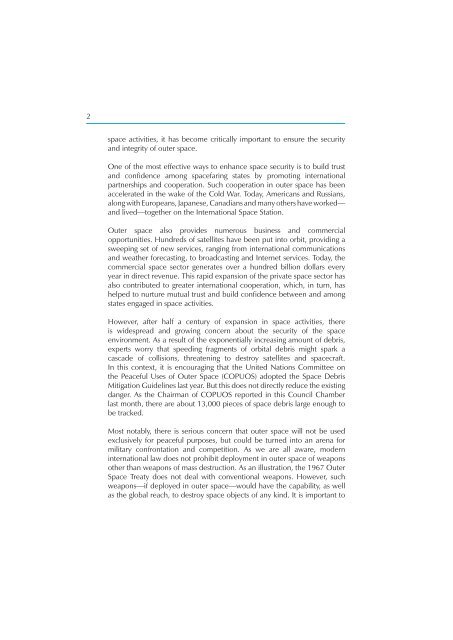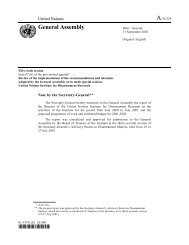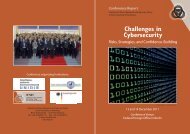Security in Space The Next Generation - UNIDIR
Security in Space The Next Generation - UNIDIR
Security in Space The Next Generation - UNIDIR
Create successful ePaper yourself
Turn your PDF publications into a flip-book with our unique Google optimized e-Paper software.
2<br />
space activities, it has become critically important to ensure the security<br />
and <strong>in</strong>tegrity of outer space.<br />
One of the most effective ways to enhance space security is to build trust<br />
and confi dence among spacefar<strong>in</strong>g states by promot<strong>in</strong>g <strong>in</strong>ternational<br />
partnerships and cooperation. Such cooperation <strong>in</strong> outer space has been<br />
accelerated <strong>in</strong> the wake of the Cold War. Today, Americans and Russians,<br />
along with Europeans, Japanese, Canadians and many others have worked—<br />
and lived—together on the International <strong>Space</strong> Station.<br />
Outer space also provides numerous bus<strong>in</strong>ess and commercial<br />
opportunities. Hundreds of satellites have been put <strong>in</strong>to orbit, provid<strong>in</strong>g a<br />
sweep<strong>in</strong>g set of new services, rang<strong>in</strong>g from <strong>in</strong>ternational communications<br />
and weather forecast<strong>in</strong>g, to broadcast<strong>in</strong>g and Internet services. Today, the<br />
commercial space sector generates over a hundred billion dollars every<br />
year <strong>in</strong> direct revenue. This rapid expansion of the private space sector has<br />
also contributed to greater <strong>in</strong>ternational cooperation, which, <strong>in</strong> turn, has<br />
helped to nurture mutual trust and build confi dence between and among<br />
states engaged <strong>in</strong> space activities.<br />
However, after half a century of expansion <strong>in</strong> space activities, there<br />
is widespread and grow<strong>in</strong>g concern about the security of the space<br />
environment. As a result of the exponentially <strong>in</strong>creas<strong>in</strong>g amount of debris,<br />
experts worry that speed<strong>in</strong>g fragments of orbital debris might spark a<br />
cascade of collisions, threaten<strong>in</strong>g to destroy satellites and spacecraft.<br />
In this context, it is encourag<strong>in</strong>g that the United Nations Committee on<br />
the Peaceful Uses of Outer <strong>Space</strong> (COPUOS) adopted the <strong>Space</strong> Debris<br />
Mitigation Guidel<strong>in</strong>es last year. But this does not directly reduce the exist<strong>in</strong>g<br />
danger. As the Chairman of COPUOS reported <strong>in</strong> this Council Chamber<br />
last month, there are about 13,000 pieces of space debris large enough to<br />
be tracked.<br />
Most notably, there is serious concern that outer space will not be used<br />
exclusively for peaceful purposes, but could be turned <strong>in</strong>to an arena for<br />
military confrontation and competition. As we are all aware, modern<br />
<strong>in</strong>ternational law does not prohibit deployment <strong>in</strong> outer space of weapons<br />
other than weapons of mass destruction. As an illustration, the 1967 Outer<br />
<strong>Space</strong> Treaty does not deal with conventional weapons. However, such<br />
weapons—if deployed <strong>in</strong> outer space—would have the capability, as well<br />
as the global reach, to destroy space objects of any k<strong>in</strong>d. It is important to








